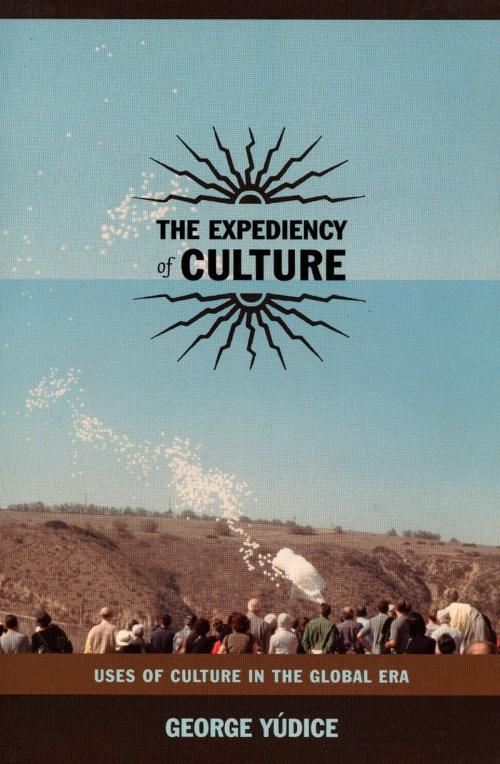The Expediency of Culture
Uses of Culture in the Global Era
Nonfiction, History, Americas, Latin America, Social & Cultural Studies, Social Science, Anthropology| Author: | George Yúdice, Stanley Fish, Fredric Jameson | ISBN: | 9780822385370 |
| Publisher: | Duke University Press | Publication: | January 2, 2004 |
| Imprint: | Duke University Press Books | Language: | English |
| Author: | George Yúdice, Stanley Fish, Fredric Jameson |
| ISBN: | 9780822385370 |
| Publisher: | Duke University Press |
| Publication: | January 2, 2004 |
| Imprint: | Duke University Press Books |
| Language: | English |
The Expediency of Culture is a pioneering theorization of the changing role of culture in an increasingly globalized world. George Yúdice explores critically how groups ranging from indigenous activists to nation-states to nongovernmental organizations have all come to see culture as a valuable resource to be invested in, contested, and used for varied sociopolitical and economic ends. Through a dazzling series of illustrative studies, Yúdice challenges the Gramscian notion of cultural struggle for hegemony and instead develops an understanding of culture where cultural agency at every level is negotiated within globalized contexts dominated by the active management and administration of culture. He describes a world where “high” culture (such as the Guggenheim Museum in Bilbao, Spain) is a mode of urban development, rituals and everyday aesthetic practices are mobilized to promote tourism and the heritage industries, and mass culture industries comprise significant portions of a number of countries’ gross national products.
Yúdice contends that a new international division of cultural labor has emerged, combining local difference with transnational administration and investment. This does not mean that today’s increasingly transnational culture—exemplified by the entertainment industries and the so-called global civil society of nongovernmental organizations—is necessarily homogenized. He demonstrates that national and regional differences are still functional, shaping the meaning of phenomena from pop songs to antiracist activism. Yúdice considers a range of sites where identity politics and cultural agency are negotiated in the face of powerful transnational forces. He analyzes appropriations of American funk music as well as a citizen action initiative in Rio de Janeiro to show how global notions such as cultural difference are deployed within specific social fields. He provides a political and cultural economy of a vast and increasingly influential art event— in**site a triennial festival extending from San Diego to Tijuana. He also reflects on the city of Miami as one of a number of transnational “cultural corridors” and on the uses of culture in an unstable world where censorship and terrorist acts interrupt the usual channels of capitalist and artistic flows.
The Expediency of Culture is a pioneering theorization of the changing role of culture in an increasingly globalized world. George Yúdice explores critically how groups ranging from indigenous activists to nation-states to nongovernmental organizations have all come to see culture as a valuable resource to be invested in, contested, and used for varied sociopolitical and economic ends. Through a dazzling series of illustrative studies, Yúdice challenges the Gramscian notion of cultural struggle for hegemony and instead develops an understanding of culture where cultural agency at every level is negotiated within globalized contexts dominated by the active management and administration of culture. He describes a world where “high” culture (such as the Guggenheim Museum in Bilbao, Spain) is a mode of urban development, rituals and everyday aesthetic practices are mobilized to promote tourism and the heritage industries, and mass culture industries comprise significant portions of a number of countries’ gross national products.
Yúdice contends that a new international division of cultural labor has emerged, combining local difference with transnational administration and investment. This does not mean that today’s increasingly transnational culture—exemplified by the entertainment industries and the so-called global civil society of nongovernmental organizations—is necessarily homogenized. He demonstrates that national and regional differences are still functional, shaping the meaning of phenomena from pop songs to antiracist activism. Yúdice considers a range of sites where identity politics and cultural agency are negotiated in the face of powerful transnational forces. He analyzes appropriations of American funk music as well as a citizen action initiative in Rio de Janeiro to show how global notions such as cultural difference are deployed within specific social fields. He provides a political and cultural economy of a vast and increasingly influential art event— in**site a triennial festival extending from San Diego to Tijuana. He also reflects on the city of Miami as one of a number of transnational “cultural corridors” and on the uses of culture in an unstable world where censorship and terrorist acts interrupt the usual channels of capitalist and artistic flows.















